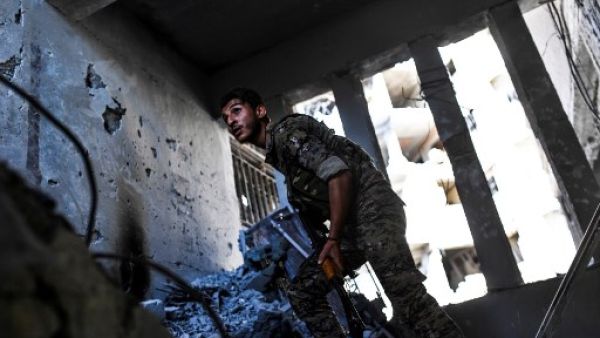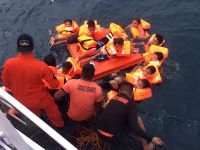- Iraqi and Syrian Kurds are closer than ever to achieving political independence
- But they have a complicated history of being played off each other by bigger powers
- Turkey supports Iraq's Kurds economically while waging war on Syrian and Turkish Kurds
- The idea of a unified Kurdistan looks unlikely
By Ty Joplin
“It is the best day of my life,” an Iraqi Kurdish voter told The Guardian on the day Iraq’s Kurdistan voted in a non-binding poll to move towards independence. That same day, Sept 25, Syrian Kurdish forces were being bombed by Russia in a gamble to derail their own attempts at gaining autonomy.
The Middle East’s political landscape is changing fast thanks to newfound Kurdish gains, and their momentum is drawing the differences between both Kurdistans starker than ever, even as they both have their strongest chance for independence yet.
Iraqi Kurdistan voted overwhelmingly to move towards independence away from Baghdad, despite the near-universal disapproval of the international community.
Syrian Kurdistan, or Rojava, is racing against the Syrian regime to capture as much oil as it can to get leverage for future autonomy talks.
Despite both Kurdish movements’ big strides towards autonomy, their relationship is anything but clear.
Though they have a shared history of statelessness and marginalization, they have distinct ideologies, strategies, and have been played off each other by Turkey who despises the Syrian Kurds but supports the Iraqi Kurds economically.
What exactly is Kurdistan?
Iraqi Kurds demonstrating outside Erbil Airport, AFP
The idea of a “Kurdistan” is basically a myth.
Kurdistan is a vague region composed of Southeastern Turkey, Northern Iraq and Syria, and Western Iran. Kurdish peoples maintain distinct languages, cultural traditions and religious views but most are Sunni Muslims.
A unified ethno-state called ‘Kurdistan’ has never really existed, and though there are separatist movements in each country to create an independent ethno-state, their ambitions for independence stop at their respective countries’ borders.
Map of Kurdistan courtesy of CIA
The Syrian Kurds’ political arm is the Democratic Union Party (PYD), and their military units include the People’s Protection Units (YPG) and the multi-ethnic Syrian Democratic Forces (SDF).
They receive military and logistical support from the U.S., but have close links to the Turkish Kurdish group, the Kurdistan Worker’s Party (PKK) which are considered a terrorist organization by both Turkey and the United States.
Iraqi Kurds maintain a de facto autonomous Kurdistan Regional Government (KRG) parliament that is led by Massoud Barzani’s Kurdistan Democratic Party (KDP).
Their military arm is the Peshmerga forces, famous for their military success against ISIS in Iraq when the governmental forces fled as fast as they could away from ISIS’ blitzkrieg.
The main differences between both Kurdish groups is their ideologies and their relationship with Turkey.
President of Turkey Recep Erdogan, AFP
According to freelance journalist Normal Costello, who has spent significant time in the region, “[t]he Syrian Kurds are linked to the teaching of the Kurdish leader Ocalan and the Kurds of Northern Iraq can roughly be divided into the eastern region under the leadership of Talabani and the west under Barzani.”
Ocalan’s political ideology is closely linked to marxism and radical egalitarianism, whereas both Iraqi Kurdish leaders, Talabani and Barzani are more closely aligned with center-left democratic socialism.
On why Kurds generally want independence; an Iraqi Kurdish resident sums it up best in a quotation to The Guardian: “They [Saddam’s Iraq] killed 11 members of my family… I was one month old at the time. How could I ever look on them [Arabs] as brothers? They hate us and we have nothing in common with them.”
Taking Advantage of Chaos
An SDF soldier in a firefight with ISIS in Raqqa, AFP
When ISIS announced itself on the global stage in 2014 by rampaging through the Middle East, the only groups that were able to withstand its initial military offensive were the SDF in Syria and the Peshmerga in Iraq.
As the Iraqi Military took their desert fatigues off and ran to Baghdad, the Peshmerga faced ISIS, knowing that if it could withstand the terrorist group’s assault, it could gain enough international support to become its own state.
Both Kurdish groups took advantage of the massive political vacuum in the region, and proved to be reliable allies in the fight against ISIS.
- The New Borders of Syria are Being Drawn Right Now in Deir Ezzour
- Israel and Russia Snub Allies, Push for Iraqi Kurdistan
They moved far beyond their traditional borders too: the SDF captured Raqqa and is currently gunning for Syria’s oil in Deir Ezzour, while the Peshmerga ventured south to take oil-rich Kirkuk. All of these key areas, apart for contested Kirkuk, lay far, far outside the traditionally understood borders of Kurdistan and have little, if any, Kurds living in them.
In this sense, the PYD and KRG have used remarkably similar tactics: leverage their relative military efficacy to forge alliances with Western powers and capture oil as a source of economic sustainability and political leverage over Damascus and Baghdad.
Syrian Kurdistan, though, hasn’t gone to the polls to formally push for independence as Iraqi Kurdistan has done.
The Turkey Problem
Turkish residents during a protest, AFP
The biggest wedge between the PYD and the KRG is Turkey.
Turkey hates the Syrian PYD, and the PYD hates Turkey back. Turkey though, is a pretty big fan of Iraq’s KRG despite some recent military bravado to prove to the world that they disliked referendum just as much as everybody else.
In 2010, Erbil opened its new airport thanks to a $550 million investment by Erdogan’s Turkey. Shortly thereafter in 2013, a new oil pipeline directly linking Kurdish-held oil with Turkey was created, undercutting both Baghdad’s hold on Iraq’s oil and any possibility of cooperation between Iraqi Kurds and the Turkish PKK, who have been at war with Turkey for 39 years.
Turkey has been slowly getting closer to Iraqi Kurds, because of their growing need for cheap, negotiable energy imports, despite the fact that they were initially grouped together with the PKK as antagonists to Ankara.
As Turkey gets more economically reliant on Iraqi Kurdistan, tensions between the different nations’ Kurdish groups have been steadily rising. The PKK attacking Turkish pipelines has now begun to seriously impact the KRG’s economic vision for its own Kurdistan.
In a spat with Turkey, the KRG then is likely to side with Turkey and away from the PKK and the Syrian PYD.
This serves Turkey well, as the weaker the PYD and PKK are, the stronger Ankara is in the ongoing civil war with its Kurdish population.
Future Kurdistan(s)
Syrian Kurds wave flags in support of Iraqi Kurdish referendum, AFP
As Iraqi and Syrian Kurds closer than ever to achieving their political aims of autonomy, their complicated history and economic ties have prevented them from effectively pooling resources and jointly pushing for a shared ethno-state.
Their differences just seem too stark to overcome, for now.
But on the prospect of future collaboration, Norma Costello notes that “[w]e've seen a thaw in relations among the Kurdish parties in the last few weeks. While the momentum of the world’s first (if not internationally recognized) Kurdish state might encourage unity momentarily there are large differences between these two groups…”
As Syrian Kurds rush to capture oil fields and Iraqi Kurdistan brace for the international backlash from their referendum, it clear that their struggles to be recognized are entering a new stage.
Currently though, any hope for an independent Kurdish region is misguided, since nearly every state with any say in the region stands firmly against the idea. The Tale of Two Kurdistans, for now, looks to be exactly that: a tale told, rather than a dream realized.







